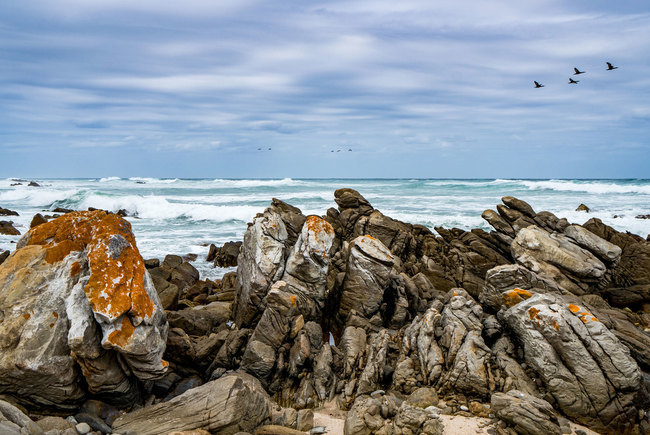Dedicated cruise deepens offshore research capacity in SA
17 March 2023 | Story Ridovhona Mbulaheni. Read time 6 min.
Two PhD students from the University of Cape Town (UCT) were part of a team of marine scientists who embarked on a multi-institutional and multi-disciplinary offshore expedition to develop the capacity of young southern African scientists and to collect data in outer shelf and deep-sea habitats. The students are Caroline Sejeng and Ndamononghenda Mateus.
The expedition was an excellent example of the teamwork needed to collectively understand, benefit from and manage South Africa’s oceans. Expedition team members spanned seven institutions and included experienced and emerging South African scientists, technicians and students from four provinces. The expedition was a great opportunity for Mateus to get to know the research community, network, and learn new research techniques. Her research interests are in marine benthic ecology, specific to benthic invertebrates. Mateus’s research project will look at infauna communities and environmental drivers of the Namibian continental shelf.
“The expedition provided me with great insight into the benthic environment. Collecting benthic data is one thing but observing the benthic ecosystem in its natural state by using a remotely operated vehicle (ROV) was a rare experience for me,” said Mateus. “It was captivating to learn how different the ocean is in many aspects while being very much connected, including the cold Benguela upwelling system (Namibia) and the warm fast-flowing Agulhas current (East London), visibility, river flows, etc. In theory, I knew all of these things, but I got to observe and experience them first-hand, learning about ROVs, environmental DNA, barcoding, dredging, and CTDs (conductivity temperature depth sensors).”

Having grown up inland in Namibia’s northern part, Mateus is fascinated by the ocean and considers it to be a personal symbol of her identity. “Being able to do research that contributes to understanding the least explored marine benthic environment is a privilege for me. I look forward to contributing to ocean education,” she said.
The expedition was designed by emerging researchers and will contribute to several postgraduate theses. Sejeng, from Limpopo, is fascinated by how physical oceanographic features play a role in influencing Marine Protected Areas. “I love going to sea and collecting oceanographic data as it is important and helps in monitoring the state of the ocean,” she said. As an emerging researcher, Sejeng said what excites her about transdisciplinary work is how the distinct disciplines connect and complement each other, the numerous opportunities available for emerging researchers, the platforms provided to meet and engage with likeminded individuals, and most importantly, the potential for growth.
“I also appreciate the platform it provides for new discoveries and innovation,” she said. Sejeng added: “Despite the fact that some days were a bit challenging at sea due to the dynamic nature of the Agulhas Current, there is no doubt that the findings from this survey, in addition to enhancing the existing knowledge, will also contribute towards the limited amount of knowledge within the Amathole region. The ocean has a personal value to me because I always find inspiration and feel revitalised from studying it. I am forever grateful for the support I have received throughout from my family, friends, and supervisors on this journey.”
Partnerships
The cruise was funded by One Ocean Hub, an international programme of research for sustainable development, working to promote fair and inclusive decision-making for a healthy ocean. The One Ocean Hub brings together people and disciplines to learn from each other and collaboratively influence decisions and practices shaping the future of the ocean for justice and sustainability. The cruise was an initiative of the Capacity Strengthening component of the hub, in partnership with the NRF/ACEP Deep Connections and Agulhas Bank Connections projects hosted at the South African National Biodiversity Institute (SANBI) and UCT respectively. The expedition was facilitated by the South African Institute for Aquatic Biodiversity (NRFSAIAB), a national facility of the National Research Foundation. The scientists aboard NRFSAIAB’s 15 m Research Vessel Observer were kippered by Captain Koos Smith and supported by Ferdinand Jacobs. The research gear includes a ROV, deep-sea landers and oceanographic instruments.
The main aim of the cruise was to develop the capacity of a team of young researchers who can work together to solve the challenges of offshore research and management. It was led by early-career researcher, Luther Adams, a UCT alumnus currently working at SANBI. Research goals include the use of cutting-edge genetic research to detect environmental DNA of threatened species, exploring patterns in invertebrate and fish biodiversity with increasing depth and work to understand the drivers of these patterns in the dynamic high current environment of the Amathole Offshore Protected Area.
The project also includes innovative, social and cultural aspects that recognise the deep human connections with the ocean and the team are working on understanding the use of marine species in medicine and ritual practices, including the identification and mapping of Culturally Significant Areas in the coastal and ocean environment.
 This work is licensed under a Creative Commons Attribution-NoDerivatives 4.0 International License.
This work is licensed under a Creative Commons Attribution-NoDerivatives 4.0 International License.
Please view the republishing articles page for more information.
Women’s Month 2023
UCT women in the news

The inclusion of gender-diverse individuals in Women’s Month initiatives and at the university at large was under discussion during a lunchtime webinar hosted by UCT’s Faculty of Health Sciences.
28 Aug 2023 - 7 min readUCT’s Women’s Day event
This year we celebrated Women’s Day on 10 August 2023.
Deputy vice-chancellors Professor Sue Harrison and Professor Elelwani Ramugondo hosted an event in honour of the recipients of UCT’s For Womxn By Womxn research grants; as well as other phenomenal womxn across the university.
UCT women in the news

Cwenga Koyana recently addressed the UNESCO and Women@Dior Global Conference in Paris on her social-impact project, Talitha Together, which won the programme’s Dream for Change competition in 2022.
27 Mar 2023 - 8 min read
Two PhD students from UCT were part of a team of marine scientists who embarked on an offshore expedition to develop the capacity of young southern African scientists and to collect data in outer shelf and deep-sea habitats.
17 Mar 2023 - 6 min read










































